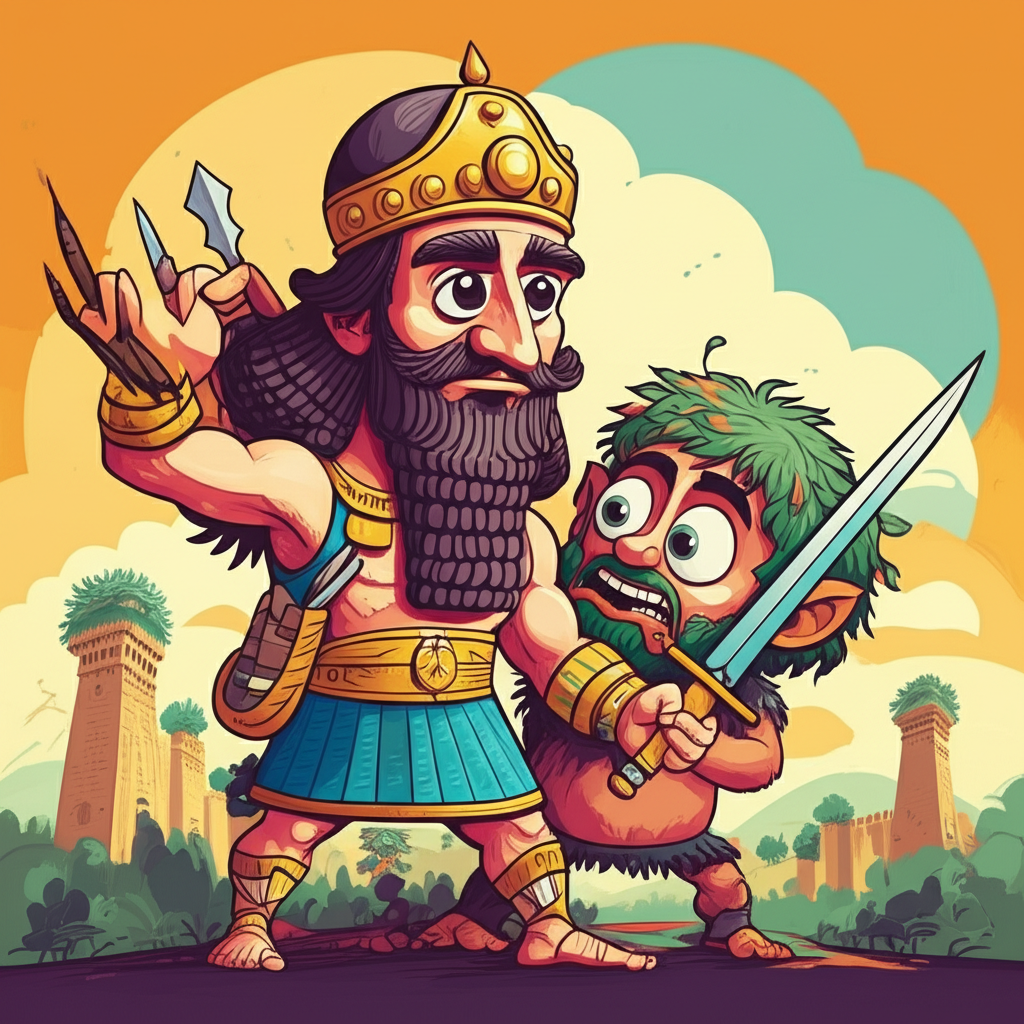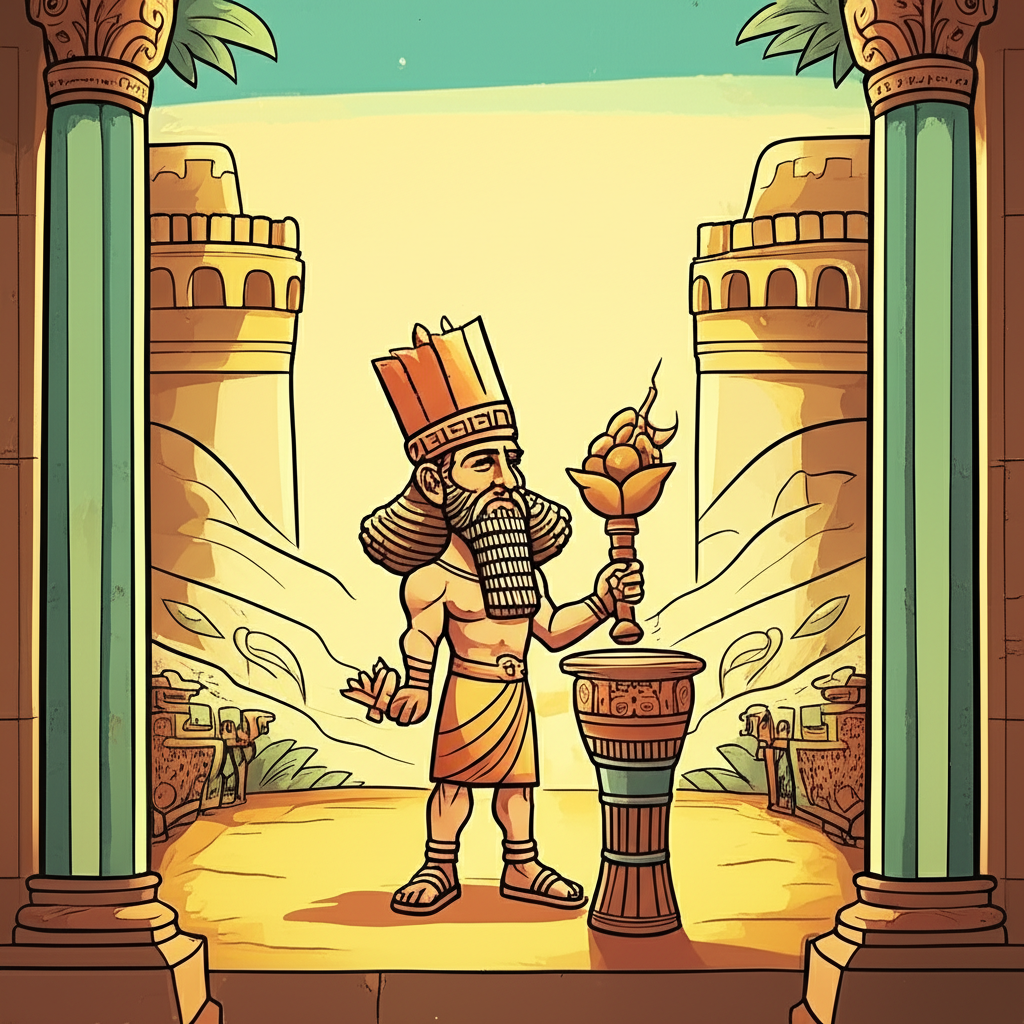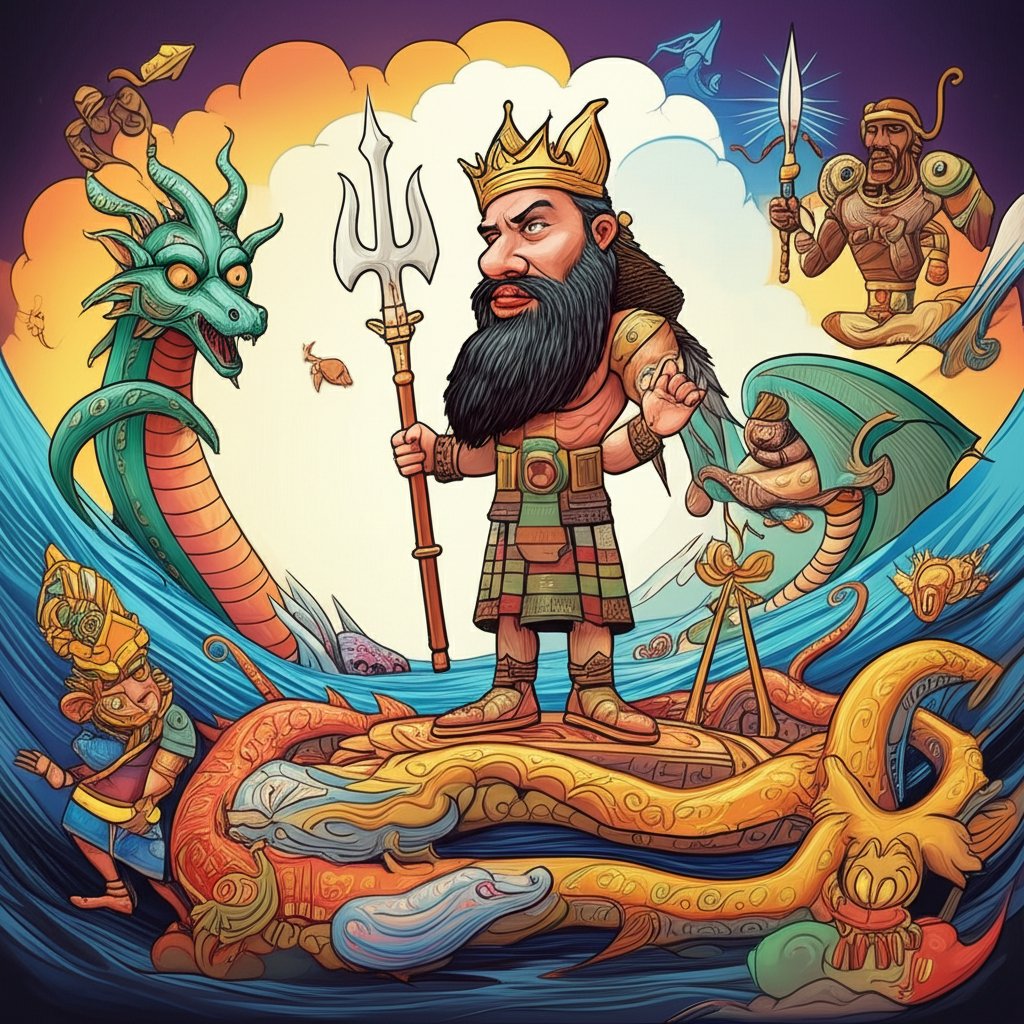
From the sun-baked plains of ancient Mesopotamia, where the Tigris and Euphrates rivers carved fertile cradles for burgeoning civilizations, emerges a tale that has echoed through millennia: the Epic of Gilgamesh. This grand narrative, pieced together from fragments found in the dust of forgotten cities, offers a profound glimpse into the worldview of a people who lived and breathed their myths. It is a traditional story, woven from the threads of human experience, told by ancient peoples to understand themselves and the vast, often mysterious, world around them.
Origins and Cultural Background: A World Under the Gaze of the Gods
The story of Gilgamesh originates from the Sumerian and Akkadian cultures of Mesopotamia, flourishing roughly between the third and second millennia BCE. This was a land of city-states, each with its own patron deity, where life was intimately tied to the cycles of agriculture, the unpredictable temper of the rivers, and the ever-present awareness of the divine. For the people of this era, the world was not a secular space governed by natural laws alone, but a vibrant, populated realm where gods and goddesses actively intervened in human affairs. They believed in a pantheon of powerful beings who controlled the skies, the earth, and the underworld, and whose favor, or displeasure, could shape destiny. Their understanding of life was often intertwined with a sense of awe and a degree of fatalism, acknowledging the immense power of forces beyond their control. The Epic of Gilgamesh, therefore, is a product of this deeply spiritual and often precarious existence, reflecting their hopes, fears, and their enduring quest for meaning.
Enkidu: The Wild Heart and the Civilized Soul
At the heart of Gilgamesh’s journey lies his profound friendship with Enkidu. Enkidu is not a creature of flesh and blood as we might understand it. He is depicted as a wild man, born and raised in the untamed wilderness, his body covered in hair, his companions the beasts of the field. He runs with the gazelles, drinks from the same streams, and lives a life of instinct and freedom. This portrayal is symbolic. Enkidu represents the raw, primal force of nature, the untamed spirit that exists before the imposition of societal norms and the constraints of civilization. He is a being of immense strength and purity, untouched by the complexities and corruptions of human society. His symbolic attributes lie in his connection to the wild, his unbridled power, and his initial lack of human consciousness, making him a perfect counterpoint to the burgeoning, yet arrogant, king.
The Tale Unfolds: A King’s Quest for Immortality
The Epic begins with Gilgamesh, the mighty king of Uruk, a city of imposing walls and proud temples. Gilgamesh is a figure of immense physical prowess, two-thirds god and one-third man, a ruler whose strength is matched only by his arrogance. He subjects his people to grueling labor, his pride a heavy yoke upon their shoulders. The gods, hearing the lamentations of Uruk, create Enkidu from the clay of the earth, a wild counterpart to the king, intended to challenge his might and curb his tyranny.
A hunter, disturbed by Enkidu’s interference with his traps, recounts the tale of this wild man to Gilgamesh. Intrigued, the king dispatches a temple prostitute, Shamhat, to lure Enkidu away from his wild existence. Shamhat, a figure who embodies the transition from the primal to the civilized, seduces Enkidu. After seven days and seven nights of communion, Enkidu’s primal nature begins to recede. He is clothed, fed, and taught the ways of humankind. The beasts of the wilderness, once his kin, now flee from him, recognizing the change within.
Enkidu, now transformed, travels to Uruk and confronts Gilgamesh. Their battle is legendary, a clash of titans that shakes the very foundations of the city. Yet, as they wrestle, a profound respect dawns between them. Gilgamesh, recognizing Enkidu’s equal strength and nobility, declares him his brother. Thus begins one of the most celebrated friendships in ancient literature.
Together, Gilgamesh and Enkidu embark on daring adventures. Their most famous exploit is their journey to the Cedar Forest to slay the monstrous Humbaba, a fearsome guardian of the sacred trees, appointed by the gods. This quest is not merely about glory; it represents the human desire to conquer the unknown, to tame the wild, and to assert dominion over nature. They face Humbaba’s terrifying roars and his enchanted forests, ultimately defeating him and bringing back cedar logs to Uruk, a testament to their bravery and the expansion of human influence.
However, their triumphs stir the ire of the gods. Ishtar, the goddess of love and war, propositions Gilgamesh. When he rejects her advances with contempt, she unleashes her wrath, sending the Bull of Heaven to ravage Uruk. Again, Gilgamesh and Enkidu rise to the challenge, slaying the divine beast.
But this victory comes at a terrible cost. The gods decree that one of them must die for their transgressions. Enkidu falls ill, his body wasting away. In his final days, he dreams of the underworld, a grim, dusty realm where the dead exist in a state of perpetual gloom. His death is a profound shock to Gilgamesh. He is plunged into a deep despair, a terror of his own mortality. The loss of his dearest friend forces him to confront the ultimate human fear: the inevitability of death and the oblivion that follows.
Driven by this newfound terror, Gilgamesh embarks on a desperate quest for immortality. He seeks out Utnapishtim, the only mortal granted eternal life by the gods, who survived a great flood and was then elevated to godhood. The journey is arduous, traversing treacherous mountains and facing mythical guardians. He finally reaches Utnapishtim, who recounts the story of the great flood, a tale eerily similar to later biblical narratives. Utnapishtim explains that immortality is not for humans and offers Gilgamesh a test: stay awake for six days and seven nights. Gilgamesh, exhausted by his journey, falls asleep almost immediately, failing the test.
Disheartened, Gilgamesh is about to return home when Utnapishtim’s wife suggests a final act of kindness. She bakes loaves of bread, one for each day Gilgamesh slept, marking the passage of time and his failure. Utnapishtim then reveals the existence of a plant at the bottom of the sea that can restore youth. Gilgamesh dives and retrieves the plant, but on his journey back, a serpent steals it while he rests. The serpent sheds its skin, symbolizing renewal, while Gilgamesh is left to face his inevitable end.
Returning to Uruk, Gilgamesh is no longer the arrogant king but a wiser, more resigned man. He gazes upon the mighty walls of his city, understanding that its enduring strength lies not in his own immortality, but in the legacy of human achievement and the collective endeavors of his people. He realizes that while individual life is fleeting, the works of man, the civilization they build, can endure.
Symbolism and Meaning: Reflections of the Human Condition
The Epic of Gilgamesh is rich with symbolism, offering insights into the ancient Mesopotamian psyche. The civilization of Uruk represents order, human achievement, and the collective spirit, contrasted with the wildness of Enkidu, which symbolizes the untamed forces of nature and primal instinct. The quest for immortality is a profound exploration of the human fear of death and the yearning for permanence in a transient world. The gods themselves embody the unpredictable forces of nature and the overarching cosmic order that humans must navigate. Humbaba represents the untamed wilderness that humanity strives to conquer, while the Bull of Heaven signifies divine retribution for hubris. The underworld, a place of dust and silence, reflects a somber view of the afterlife, emphasizing the preciousness of life lived. Ultimately, the story speaks to the fundamental human experience of friendship, loss, the confrontation with mortality, and the search for meaning in a universe governed by forces both awe-inspiring and terrifying.
Modern Perspective: A Timeless Resonance
The Epic of Gilgamesh continues to resonate in the modern world. Its themes of friendship, the struggle against death, and the search for meaning are universal. It has inspired countless works of literature, from poetry and novels to plays and operas. In popular culture, elements of the epic can be found in video games, where quests for legendary artifacts and battles against mythical beasts echo Gilgamesh’s adventures. In film, the epic’s grand scope and heroic journeys have provided fertile ground for cinematic adaptations and thematic explorations. Academically, the Epic is a cornerstone of Assyriology and a vital source for understanding ancient Near Eastern history, religion, and literature. It serves as a powerful reminder of the enduring power of storytelling and its capacity to connect us across vast gulfs of time.
Conclusion: A Legacy of Stories
The Epic of Gilgamesh, with its tales of Uruk, its wild man, and its king’s desperate quest, is a testament to the imaginative spirit of ancient peoples. It is a cultural artifact, a story told and retold, passed down through generations, offering a window into their understanding of the world and their place within it. As Muslims, we recognize that only Allah is the true Creator and Sustainer, the ultimate source of all existence. Yet, the study of such ancient narratives allows us to appreciate the rich tapestry of human cultural heritage, the enduring power of imagination, and the universal human drive to tell stories that help us grapple with the profound questions of life, love, and mortality. The songs of Nineveh, carried on the winds of time, continue to sing to us of the human condition, a timeless echo from the cradle of civilization.




